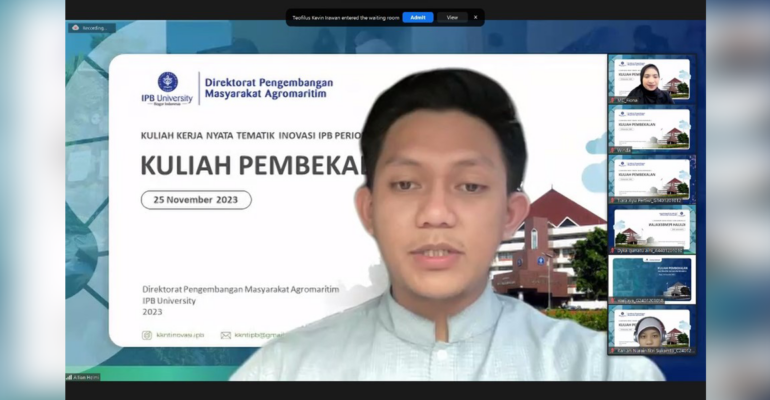Improving the Skills of KKN-T Innovation Students, DPMA IPB University Gives Another Debriefing Lecture

The Directorate of Agromaritime Community Development (DPMA) of IPB University once again gave a briefing lecture for students of the Innovation Real Work-Thematic Lecture (KKN-T) for the period of December 2023.
The briefing given this time was related to sustainable development goals (SDGs), social entrepreneurship, utilisation of household waste by cultivating black soldier fly (BSF) and making liquid organic fertiliser (POC) as an effort to manage livestock waste.
Dr Alfian Helmi, Assistant Director of Strategic Studies, Directorate of Strategic Studies and Academic Reputation (DKSRA) IPB University on that occasion explained that Indonesia’s SDGs achievement was still low, which was ranked 75th. Therefore, activities based on the indicators of SDGs achievement are needed.
“The gap at the district or city level is still a challenge. Most areas in West Java Province still have a higher poverty rate than the provincial average,” he said.
Dr Helmi advised, “Make programmes that can be done in a short time. When planning the programme, it needs to be directed towards achieving the SDGs as well as identifying potentials, problems and needs.”
Dr Burhanuddin, IPB University lecturer from the Faculty of Economics and Management, presented the material on social entrepreneurship. He explained that social entrepreneurship is an entrepreneurship that mobilises the community starting from one person, ten people, even one village.
“Social entrepreneurship is when we see a problem, then decide to help solve the problem,” he continued.
Dr Muhammad Farid, a lecturer at the Faculty of Mathematics and Natural Sciences (FMIPA) of IPB University, provided material on the use of household waste by cultivating BSF or commonly known as maggot. He revealed that household waste can be converted into high-value products (maggot) through a bioconversion process.
“Maggot can be a highly nutritious animal feed. In addition, maggot production does not require water and electricity and the production technology can be done easily by the community,” he explained.
The last material, which was related to the making of POC as an effort to manage livestock waste, was delivered by Dr Salundik. According to Dr Salundik, livestock faeces/waste can be harmful and disruptive to the environment. Therefore, it is better for the livestock waste to be managed and utilised properly.
“In managing waste, we must first know its characteristics, because the treatment in managing waste will be different,” said the lecturer at the Faculty of Animal Sciences, IPB University. (*/Rz) (IAAS/RUM)



